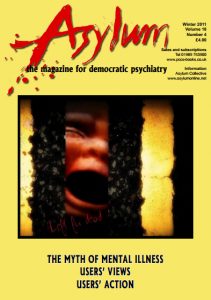After three editions devoted to one or another specific issue, this one covers a variety of topics. We are pleased to say that the bulk of it consists of the considered views of various service users or ex-users. (Or ‘survivors’ – there still doesn’t seem to be an agreed word to replace ‘patient’…) And you will see that we now introduce a regular section for Poetry and Creative Writing, co-edited by Clare Shaw and Phil Thomas. If you have any ideas for this, please contact either of them (see contact list on p.2).

Whether poetic, creative or simply heartfelt, Asylum magazine cannot survive without contributions from our readers, or material which they discover and let us know about. So, however you wish to say something or have something heard, keep the contributions coming in! THE DEEPEST CUTS – WORK CAPABILITY ASSESSMENTS & THE DISABILITY LIVING ALLOWANCE The Government presses ahead with its cuts. Aside from cuts in local provisions, everyone on a Disability Living Allowance (DLA) is to be ‘re-assessed’.
The plan is to remove 360,000 people from DLA by 2013, and officials have begun to review every recipient for ‘fitness for work’. The Government hopes to reduce total welfare payments and transfer as many people as possible from DLA onto Jobseeker’s Allowance. There is no sign that those with mental health problems will be given any particular assurances or help when faced with their Work Capability Assessment. (But compare this timid Con-Lib idea with the recent comments on his visit to Europe by veteran critic of psychiatry, Thomas Szasz.
When challenged to support those on DLA fighting the cuts, he said that the state should not provide welfare support at all. Szasz’s libertarian-right politics were made clear when he set himself against ‘… politicians who want to change the world, like’ – wait for it – ‘Hitler or Obama’.) Meanwhile, in the real world, disabled people and their carers struggle on. Those on DLA are twice as likely to live below the poverty line as the non-disabled. Nearly half of disabled people have ‘no savings at all’, compared to just 12% of the general population.
72% of carers with substantial caring responsibilities are worse off as a result of caring – more than half are in debt and three-quarters already struggle to pay the basic household bills. Disabled people are also disproportionately deprived of education – 23% have no qualifications, compared to 9% of non-disabled. And only half of disabled people of working age are in work, compared to 80% of non-disabled. Most affected are those with mental health problems – only 20% are in paid employment. (See website for The Hardest Hit, a campaign run by a consortium of more than fifty major charities: http://thehardesthit.wordpress. com).
Every decade or so, whichever Government is in power has another go at cracking the populist nut of ‘the costs of benefits to the taxpayer’. And every past initiative dribbled out into failure, often costing far more than the benefits saved. Of course, the Government’s rationale is to save a few £billion, catch benefit cheats and discover those who really could work and help them get back into work. Yeah, right, when the official UK unemployment figure has hit three million …
It was always possible to go after cheats without introducing an intimidating review for everyone on DLA. You would imagine that most of the cheats would be wily enough to escape this dragnet, anyway. But meanwhile all the most vulnerable members of the community are going to be made much more anxious, and no doubt a considerable number will be driven deeper into poverty. We’re all in this together? Yeah, right. It looks more like business as usual for the upper echelons of banking and the big corporations – higher salaries and bonuses, tax breaks, tax havens and other perks …
Download Volume 18 No 4
Contents
- Editorial
- Mad Cuts. Ian Parker
- 50 Years Since the Publication of The Myth of Mental Illness. Phil Virden
- Increase in Psychiatric Compulsion in the UK. George Fowler
- The Consequences of Psychiatric Misunderstandings. Anon
- Christianity and Psychiatry: A Personal Perspective. Alan Jennings
- Hearing Voices and Social Contexts. Peter Donnelly
- Liberty and Well-Being. Dean Smith
- A Clients View of Capitalist Psychiatry. Philip Hutchinson
- Family Habits. Joe Malone
- Struggling Against Psychiatry’s Violations of Human Rights. Don Weitz
- Psychiatry and Oppression: a Personal Account. Dr. B Gray.
- Psychout: Building a Global Coalition of Activists. Shaindl Diamond and Bonnie Burstow
- We Do Not Believe in Silence. Poetry Section by Clare Shaw and Phil Thomas.
- Asylum at Manchester’s Okasional Café
- Hellenic Observatory for Rights in the Field of Mental Health
- Trouble At T’Diagnostic and Statistical Mill. David Greenberg.
Asylum-18.4-2011_compressed
